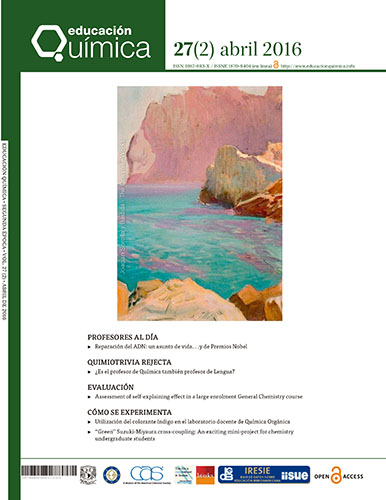Assessment of self-explaining effect in a large enrolment General Chemistry course
Contenido principal del artículo
Resumen
Self-explaining refers to the generation of inferences about causal connections between objects and events for one’s own consumption. Self-explaining is amongst the practices of science deemed essential for scientific competence; therefore, a valued learning outcome in itself. Nonetheless, generation of authentic explanations is seldom promoted in college science instruction. This work examined the effect of engagement in self-explaining on conceptual understanding of chemistry. Learning and performance tasks were completed individually in the classroom ecology of a large-enrolment General Chemistry course in the US. The study spanned a period of five semesters including pilot-tests and replications. The self-explaining intervention followed a multi-condition comparison design that used performance on a post-test to assess learning. Students were randomly assigned to the following conditions: reviewing a correct explanation, explaining correct or incorrect answers, explaining agreement with answers produced by others, and explaining their own answers. A cohort of students who underwent standard instruction with no intervention and had prepared for formal examination served as reference. The self-explaining cohorts performed better than the reference group, and in one case was the difference statistically significant. Findings suggest that self-explaining activities support students’ conceptual understanding at least as much as instruction. This study contributes evidence for the self-explaining effect and the ICAP hypothesis in a discipline where no evidence is available. Furthermore, it adds to the relatively little work in self-explaining that has explored naturalistic learning environments. This work supports the incorporation of self-explaining activities in the repertoire of instructional practices for General Chemistry
Detalles del artículo
Citas en Dimensions Service

Educación Química por Universidad Nacional Autónoma de México se distribuye bajo una Licencia Creative Commons Atribución-NoComercial-SinDerivar 4.0 Internacional.
Basada en una obra en http://www.revistas.unam.mx/index.php/req.




